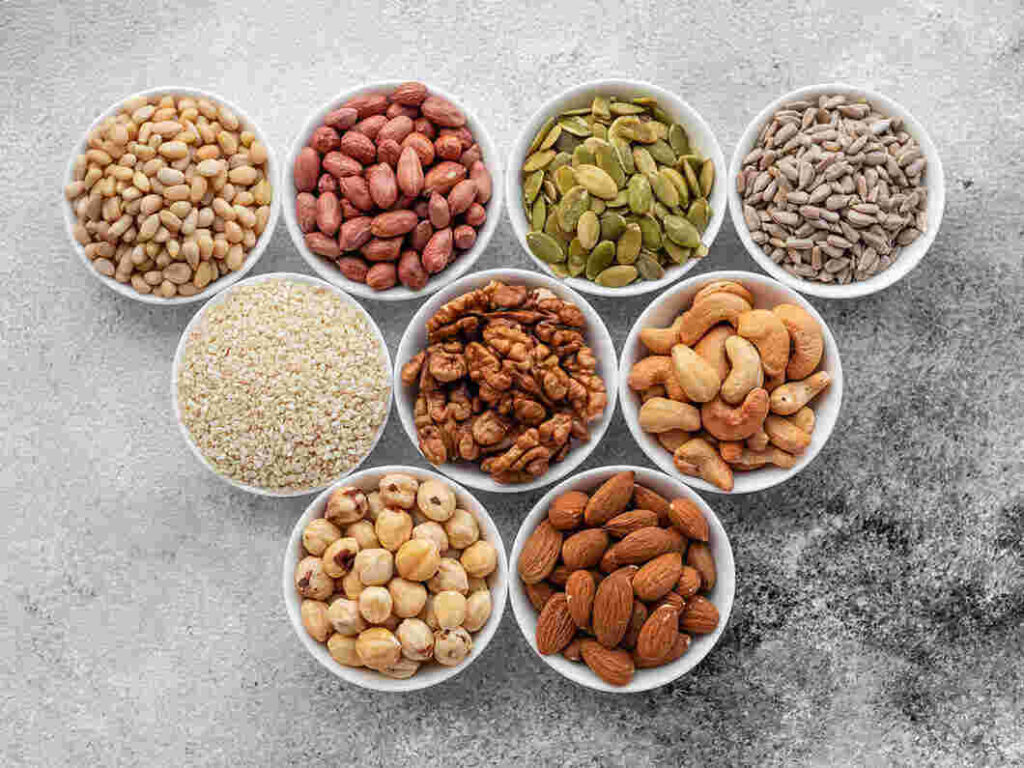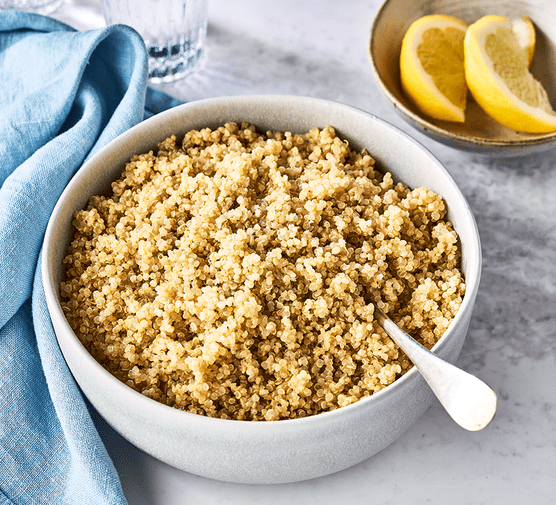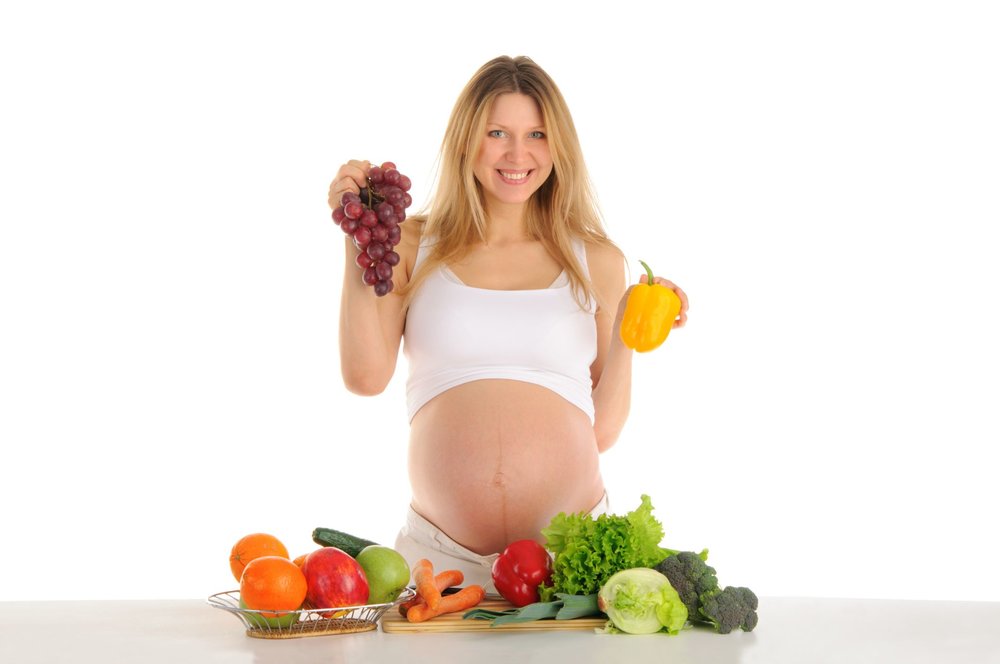The fertility diet is a preconception guide to better reproductive health rather than a specific dietary regimen. It may not raise your chances of becoming pregnant, but it can improve women’s health in general. A 2019 study discovered that greater live births among people using assisted reproductive technologies were connected with higher adherence to a pro-fertility diet that contains high levels of folic acid, dairy, soy, vitamin B12, vitamin D, and low-pesticide food.
According to a 2018 analysis, women wanting to get pregnant should concentrate on boosting omega-3 fatty acids, whole grains, fish, and soy while reducing trans fats and red meat. This diet is comparable to the Mediterranean diet, a heart-healthy routine centered around plant-based foods, whole grains, vegetables, legumes, fruits, nuts, seeds, herbs, and spices, as well as fish, seafood, dairy, poultry, and olive oil.
Foods to Include in a Fertility Diet
There are no special foods that can help you conceive, but you may support your fertility by including wholesome options from the following food groups in your diet.
Fruits and Vegetable
According to Alisa Vitti, integrative nutritionist and author of WomanCode: Perfect Your Cycle, Amplify Your Fertility, Supercharge Your Sex Drive, and Become a Power Source, “Watermelon and asparagus, in addition to other raw fruits and vegetables, give the body a rich supply of glutathione, which is important for egg quality.” Kale is another superfood vegetable since it has nutrients essential for the metabolism of estrogen.
Even though it’s ideal to eat the fruit or vegetable whole, Vitti advises juicing kale and other greens if you don’t like raw vegetables. Since goji berries include phytochemicals that are good for fertility, she loves advising patients to make fresh juices that are primarily made of vegetables. Vegetables can be microwaved or roasted at high heat for a brief period of time without any water to prevent nutrient loss.

Food rich in Folate
According to the findings of a prospective cohort study, more folate consumption is linked to greater implantation rates, clinical pregnancies, and live births, particularly in patients receiving treatments using assisted reproductive technology. Lentils, beans, citrus fruits, Brussels sprouts, broccoli, and asparagus are a few examples of foods high in folate.

Complex Carbohydrates
Try to include more complex (“slow”) carbs and less highly processed ones to boost fertility. Refined carbohydrates, such as those found in cookies, cakes, white bread, and white rice, are readily absorbed by your body and converted to blood sugar. The pancreas produces insulin into the bloodstream to reduce the blood sugar surge, and studies have discovered that high insulin levels seem to prevent ovulation.
Complex carbohydrates are absorbed slowly and have a more progressive impact on blood sugar and insulin levels than simple carbohydrates (those devoid of fiber, such as fruits, vegetables, legumes, and whole grains). Additionally, barely refined grains are a fantastic source of fiber, vitamin E, and fertility-friendly B vitamins.
Reducing gluten intake may also be suggested for some persons, especially those with hormonal conditions like polycystic ovary syndrome (PCOS). Research has shown that eating gluten causes the body to respond in an inflammatory manner, raising C-reactive protein and signaling that it’s not a good time to get pregnant. It is known to suppress ovulation and makes implantation more challenging. Before making any significant dietary changes, you should consult your doctor. You should also have a plan for your meals that excludes gluten.
Fats
Any balanced diet should include healthy plant-based fats in moderation. Olive oil, grapeseed oil, nuts, avocados, and other inflammatory-reducing foods can support regular ovulation and enhance female fertility in general by reducing inflammation in the body.
Even those who actually struggle with infertility may benefit from some fats. According to studies, eating a particular amount of avocados’ monounsaturated fats throughout an IVF cycle raised the success rate by three and a half times compared to women who didn’t consume any healthy plant-based fats at that time.
Avoiding trans fats, which are present in packaged meals and processed snacks like French fries, and consuming more unsaturated fats can also be beneficial. Insulin resistance is increased by trans fats. Resistance makes it more difficult to get glucose into the cells from the bloodstream; insulin aids in this process.
In spite of this, the pancreas continues to produce more insulin, which then enters your bloodstream. When designing a fertility diet, it is preferable to concentrate on foods that combat insulin resistance because high insulin levels lead to a number of metabolic abnormalities that impact ovulation.
Lycopene
Antioxidants are abundant in lycopene-rich foods like tomatoes, pink grapefruit, watermelon, guava, and papaya. Lycopene is thought by some experts to be a potential treatment for male infertility because of its antioxidant qualities and capacity to lessen oxidative stress.
Dairy Products
To enhance fertility, lactose-intolerant people should choose whole milk or other full-fat dairy products (like yogurt) rather than non-fat and low-fat varieties. Because a high intake of low-fat dairy has been demonstrated to increase the risk of ovulatory infertility compared to high-fat dairy, it has also been discovered that the more low-fat dairy products a woman consumed, the more difficulty she had becoming pregnant.
On the other hand, you might want to think about completely eliminating dairy from your fertility diet plan if you’re still having difficulties becoming pregnant. The production of cow dairy has become very chemically manipulated, we are exposed to dairy in large quantities that is more hormonally driven. The brain’s attempts to communicate with the endocrine system, in especially with the ovaries, may be hampered by these extra hormones. If you choose to temporarily give up dairy, just be sure to talk to your doctor about the best ways to supplement your calcium intake.
Protein
Great sources of protein, zinc, and iron—all necessary building blocks for a healthy pregnancy—include lean cuts of chicken, turkey, pork, and beef. On the other hand, an investigation into nutrition and fertility indicated that excessive saturated fat found in animal protein may be related to problems with conception.
Seafood protein sources can also be healthy choices. For example, cold-water fish like salmon, canned light tuna, and sardines are great sources of DHA and omega-3 fatty acids. They also aid in the development of the baby’s nervous system and lower the risk of an early birth, so why not start before conception? According to Vitti, “you shouldn’t be concerned about your mercury intake if you eat these foods a few times a week as part of a fertility diet”.
Another potent source of protein in a diet for fertility are eggs. They get a bad rap for having high cholesterol, but the yolk has excellent protein reserves and choline, a vitamin that aids in the development of baby’s brain function.
Quinoa
Quinoa is a great food option to help manage blood sugar levels. For those who have PCOS, which is partly brought on by insulin resistance, this may be even more important. Anything that helps to normalize blood sugar levels can be beneficial because people with PCOS experience considerable ovulation disruptions.

Limit or Avoid these Foods when following a Fertility Diet
Everybody’s diet will be different, and it’s important to always pay attention to your body when it comes to nutrition, but if you’re trying to conceive, it may be useful to know how the following foods can affect your and your partner’s fertility and make food decisions from a sense of empowerment. ( Click here to find out food to avoid during pregnancy)
Alcohol
Most experts advise against drinking when trying to get pregnant. In addition to contributing to dehydration, heavy alcohol consumption—including binge drinking—has been linked to decreased fertility. Additionally, the fetus may be at risk if you habitually drink and become pregnant without realizing it.
A study that was published in the International Journal of Environmental Research and Public Health indicated that alcohol usage can affect sperm health and may have long-term consequences on the fetus as well, so it’s crucial to remember that the advantages of abstaining don’t simply apply to the couple becoming pregnant. In conclusion? It can be ideal for you and your spouse to minimize drinking if you’re trying to get pregnant.
Caffeine
If you are a coffee enthusiast, you don’t have to give up your daily cup entirely, but it may be beneficial to drink tea and coffee in moderation when trying to conceive. The Harvard study found that drinking multiple cups of coffee or tea per day had minimal impact on ovulation issues—but it could result in dehydration.
Additionally, caffeine is a diuretic that can hinder your mucous membranes from remaining moist, which can influence the nature of your cervical mucus. This is possibly most significant for individuals trying to conceive. (The more fertile cervical mucus you have, the better chances the sperm has of “sticking” to it and reaching the egg).
Processed Sugar and Refined Carbohydrates
All persons, but especially those with PCOS, should limit their intake of foods and beverages rich in processed sugar, such as sodas, refined carbohydrates containing high-fructose corn syrup, such as white bread, and other carbs high in added sugars. That’s because, according to the Office on Women’s Health, PCOS can lead to blood sugar problems that can interfere with ovulation. Reducing your consumption of these high-sugar foods can also aid in weight loss. The odds of becoming pregnant can often be increased by even a minor amount of weight loss.
Trans fats and Partially Hydrogenated Oils
A 2019 research found that eating meals high in trans fats may increase the risk of infertility in both males and females. Trans fats transform a liquid oil into a solid at room temperature, which is fantastic for keeping food fresh but bad for your reproductive system and much worse for your heart health. Fried foods, margarine, spreads, crackers, cookies, shortening, salad dressing, frozen foods, cookies, and chips all contain trans fat.
Partially hydrogenated oils are a problematic technique to introduce trans fats into a product while maintaining the product’s claim of zero trans fats. There are a number of common goods, such as certain peanut butter, crackers, and pre-packaged pastries, where you might find this on the ingredients list.
Processed Soy
Research indicates that soy may have a detrimental influence on fertility, thus it may be beneficial to stay away from processed soy products in your diet, especially powders and energy bars. For instance, ovarian function may be adversely affected by diets high in soy, according to a study published in the Journal of Nutrition. According to some experts, these products’ significant amounts of soy protein isolate have estrogen-mimicking qualities that may upset your hormonal balance.
Know the Meals that will promote Male Fertility
It’s simple to overlook the fact that a male spouse can contribute 50% of the baby-making process. If you cook and eat at home with your boyfriend, help make vegetables the main ingredient on his dish. To stop testosterone from being turned into estrogen, Vitti encourages male partners to consume foods high in zinc, such as asparagus, sunflower seeds, and other legumes.
In order to improve male fertility, they could also have to skip the cheese plate: Poor sperm motility and concentration have been associated with high dairy consumption. They can be urged to take vitamins every day. On the market, prenatal supplements are packaged with nutrients for male fertility, such as vitamin C, vitamin E, selenium, zinc, and lycopene.
Additional Methods to boost Fertility
One method to increase your chances of getting pregnant is through diet. There are numerous additional techniques to boost fertility. While the advice provided below is basic advice, it is important to engage with your provider to develop a strategy that addresses your unique fertility needs.
Take a Prenatal Vitamin
A perfect diet is challenging to follow, therefore it is suggested to take supplements to make up for any nutritional shortfalls, such as a multivitamin or prenatal vitamin support. According to studies, a woman’s daily multivitamin will contain a B12 complex and 800 mcg of folic acid. Vitamin C, other B vitamins, calcium, vitamin D, iron, and omega-3 fatty acids should also be present.
A standard multivitamin is adequate for guys. Most conceptions—about half of them—are unplanned. Additionally, until the fetal spinal cord is developing, the majority of women are unaware that they have missed a period. Prenatal vitamins should be taken by all women of reproductive age up until they are done having children and have reliable contraception.
Keep your Weight in Check
Ovulatory dysfunction is more common in people with BMIs over 27. In fact, maintaining a healthy weight will aid to increase fertility in both men and women. Men who are overweight have lower sperm counts, altered hormone levels, and impaired sperm motility, according to the Academy of Nutrition and Dietetics. Exercise is good for you, but keep vigorous exercise to five hours or less per week if your BMI is under 25.
Steer clear of Environmental Toxins
Pesticides, heavy metals, dry cleaning solvents, and possibly BPA (which is included in some plastics) can all have a negative impact on fertility and pregnancy. Avoid smoking tobacco as it has been linked to subfertility.
Additionally, smoking may reduce blood supply to the embryo and raise the risk of early miscarriage. But it’s vital to remember that smoking-related infertility can be resolved within a year of quitting. When receiving reproductive treatment, marijuana users reported a greater risk of miscarriage than non-users. Although excessive heat, such as that seen in saunas, may bring about brief alterations, it has no effect on either a woman’s or a man’s fertility.
Consult with your Doctor Frequently
Working closely with your doctor or healthcare team and trying your best to follow their advise is a crucial part of boosting fertility. If, after a year of frequent sex without using birth control, you are under 35 and haven’t gotten pregnant, the Office of Women’s Health advises that you speak with your doctor.
This time frame is cut in half to six months if you are over 35. Making an appointment with your OB-GYN is also a good idea if you suspect fertility issues or diminished libido or sexual function.
Outlook
For a healthy physique, reproductive system, and to aid in getting pregnant, good nutrition is essential.
Making healthy dietary and lifestyle adjustments can help increase fertility and get your body ready for motherhood. Additionally, it simply benefits you in general.
It is critical that you start living a healthy lifestyle and following a nutritious diet right away if you’re trying to get pregnant. But resist letting anxiety and stress bring you down. Find out which options are best for you by speaking with your medical team.

Wow. I didn’t know all these. Nice content. Keep it up.